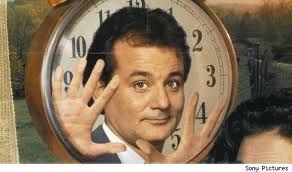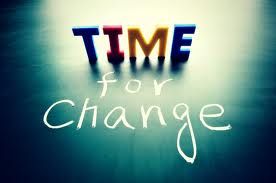Relationships
Release the Past So You Don't Get Stuck in Groundhog Day
Why We Keep Repeating Old Patterns and How We Can Change
Posted January 23, 2013

In the classic, 1993 movie, Groundhog Day, Bill Murray plays Phil, a narcissistic, self-centered weatherman whose superficial, on-camera charm quickly evaporates off-camera. When Phil is sent on a loathsome assignment to cover the Groundhog Day celebration in Punxsutawney, Pennsylvania, he brushes off any attempts by the townsfolk to get to know him, treats his cameraman and producer with contempt and is hyper to get the heck out of there. However, an unexpected snowstorm keeps him stuck, and, incredibly, when he wakes up the next day, and each day after that, it’s Groundhog day again. Everything that he accomplished the day before evaporates in a strange type of deja vu. After many desperate, failed attempts to escape, his fate, Phil eventually learns to accept his situation. He begins to care about other people, becomes the town hero, and finds love and happiness.
A Futile Struggle for Control
Groundhog Day is a powerful allegory and morality tale. Phil is Everyman in modern society –so focused on increasing his own status and resources that he misses the present moment and opportunities to build satisfying relationships. Phil, like many of us, is locked in a futile struggle to control and change a life situation that is essentially unchangeable. The only solution is to learn to accept our circumstances, adopt an “attitude of gratitude”, and put our best efforts into improving areas of life that we can control. In Phil’s case, his knowledge of what is about to happen allows him to show up at the right time to protect the townsfolk from disaster and injury.
The Science of Interpersonal Neurobiology
The movie Groundhog Day was made 20 years ago, prior to the expansion of scientific knowledge about brain plasticity, mindfulness, and the neuroscience of attachment. Yet the lessons it contains are profound and universal human truths, for which we now have a scientific basis. Based on the groundbreaking work of Dr. Daniel Siegel, Clinical Professor of Psychiatry at UCLA and founder of the field of interpersonal neurobiology, we now know that caring and empathic interactions with other people can literally shape or reshape the neuronal pathways in our brains. In positive and healing ways
Our brains contain “mirror neurons” that allow us to feel what other people feel and to have images of other people’s minds. Through interactions with empathic caregivers, children learn about their emotional worlds, their own worth and capabilities (or perceived lack of them) and whether they can trust themselves and other people. Securely attached children who experience empathic and soothing interactions with caregivers are more able to be present with their own emotions and connect right-brain based emotional states with left-brain based language and logical thinking. They are more able to make sense of, understand, and communicate their own emotions; to experience empathy and caring for others.
Insecure Attachment and Disconnection
Insecurely attached children, on the other hand, have more disconnected brains as adults. They tend to either avoid their own emotions and feel uncomfortable with closeness and other people’s emotionality, or become so flooded with intense emotions when under stress, that they act impulsively and are less able to do logical problem-solving.
The Bill Murray character in Groundhog Day begins the movie by avoiding intimacy, acting contemptuously, and pushing away other people. When trapped in Groundhog Day, he switches to the overwhelmed and impulsive pattern. He goes so far as to attempt suicide (knowing he will wake up the next day) and kidnap the groundhog. For many people, when overwhelmed with strong emotions, logic goes out the window, and we attempt to solve our life problems with strategies (like stealing the groundhog) that make no sense and are based on rigid or chaotic ways of thinking and acting. For example, people choose the same types of unhealthy partners over and over again (rigid pattern), or exhaust themselves using every strategy at their disposal to try to control their romantic partners or keep them from leaving (chaotic pattern).


Becoming Unstuck
In life, as in Groundhog Day, there is a better solution – learning to mindfully accept the current circumstances of our lives– changing ourselves, rather than expecting other people and circumstances to change. As spiritual writer Eckhart Tolle so wisely states:“Whatever the present moment contains, accept it as if you have chosen it.” If things are not going our way, perhaps it is because circumstances are leading us on a different path. If we have the courage to try new ways of thinking and behaving, we might be pleasantly surprised by how things turn out. According to Buddhist philosophy, life contains uncontrollable suffering, but fear, greed, and delusion add a second layer of controllable suffering. When we move from self-absorption to compassion and service, our lives and brain pathways expand and we begin to heal old insecure attachment patterns and negative beliefs about self and others. In fact, research shows that strong social ties and high-quality relationships are some of the strongest predictors of health and longevity.
In what ways are you stuck in Groundhog Day? What would it take for you to break old patterns of thinking and behaving that no longer serve you? Begin deliberately directing attention to positive aspects of your life and day-to-day experiences. When you are with other people, try to remain present, openhearted, and listening with intent to understand and be of help. If cantankerous Phil can transform his life, you should be able to as well. And, in the spirit of the movie, see if you can find the half-full glass and the humor in your life struggles. Happy Groundhog Day everyone!
About The Author
Melanie Greenberg, Ph.D. is a licensed Psychologist, and expert on Mindfulness, Positive Psychology, Emotion Regulation, and Relationships. Dr Greenberg provides workshops and speaking engagements for organizations, life, weight loss, or career coaching, and psychotherapy for individuals and couples in her Mill Valley office and, on a limited basis, via distance technologies.
Visit her website:
http://melaniegreenbergphd.com/marin-psychologist/
Follow her on twitter @drmelanieg
Like her on Facebook www.fb.com/mindfulselfexpress
Read her Psychology Today blog & personal blog
http://www.psychologytoday.com/blog/the-mindful-self-express




